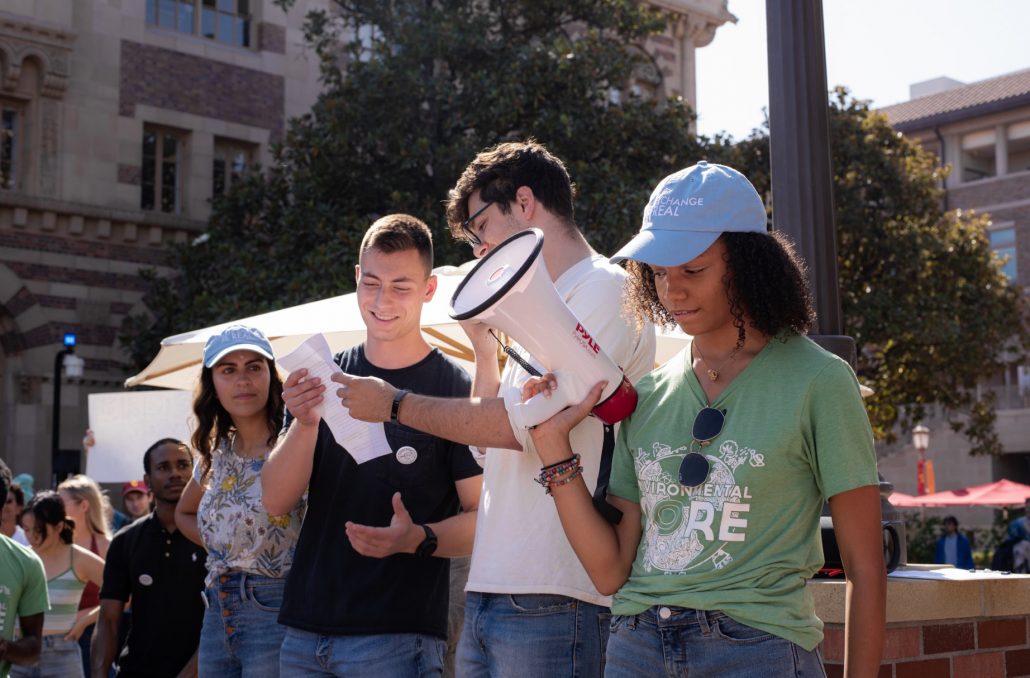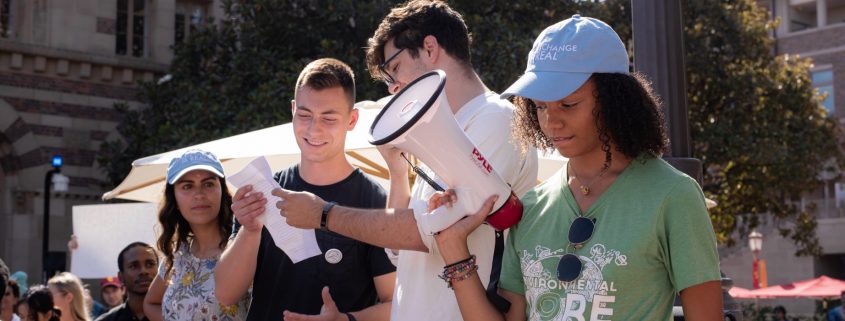Hundreds protest for environmental action in USC, U.S.

Student leaders Isabella Caltabiano, Andrew Binder, Nathaniel Hyman and Tianna Shaw-Wakerman held a climate strike on campus Friday, inviting guest speakers and audience members to voice their concerns and hopes. (Andrea Diaz | Daily Trojan)
Some came dressed in their best tailgating attire, others had their children with them, and a few even brought chairs to sit on. As ’70s classics like Earth, Wind & Fire’s “September” and the Bee Gees’ “Stayin’ Alive” blasted through a small set of speakers and groups of protesters began to form, organizers realized that this rally — held in solidarity with the millions of young people striking for the climate worldwide — was going to be big.
More than 200 USC students attended the rally in front of Tommy Trojan, carrying signs that read, “Don’t Be A Fossil Fool,” “We Took Hot Girl Summer Too Far” and “Did You Buy The Planet Dinner Before You Fucked It?”
Organized by the Environmental Student Assembly, Undergraduate Student Government and Environmental Core, the event was not the first environmental action to take place on USC’s campus. But it was, by far, the most attended.
“Last year, when we had a similar kind of event, there were about 30 people here,” said School of Cinematic Arts professor Jeremy Kagan, who spoke at the rally. “Obviously our student body is taking it seriously, and we all have to take it seriously because it’s the world we live in.”
Standing on the base of a lamppost a few feet from Tommy Trojan, speakers discussed the importance of political involvement and individual action in the face of climate change. Although the speakers’ megaphone didn’t carry sound much farther than the first few rows of people, audience members cheered enthusiastically under the hot afternoon sun.
In a speech at the beginning of the rally, ESA Co-President Nathaniel Hyman spoke about the steps individuals can take to change a political system he said does not accurately represent its constituents’ needs. While voting and striking is important, he said, that it is not enough to enact change.
“The tables are stacked against us at the institutional level,” Hyman told the crowd. “Find a campaign that supports our message and join them … We have to be forcing ourselves into every room where decisions are made.”
Senior Tianna Shaw-Wakeman, the event’s lead organizer, said in an interview that the protest’s main focus was to push for global action from local and federal governments. She said the strike’s two primary goals are reducing greenhouse gas emissions worldwide and ensuring equity and justice for marginalized communities as the transition to clean energy takes place.
Historically, USC has lagged behind other institutions in terms of its sustainability efforts. In its 2030 Sustainability Strategy, prepared in 2016, the Academic Senate found that USC’s last recorded sustainability score of 36% was 24% lower than the median of its peer institutions. After USC released the August update to its 2020 Sustainability Plan, student leaders cited unclear messaging and lack of initiative as roadblocks to the plan’s success.
Shaw-Wakeman said she hopes the strike signaled the need for a new era in sustainability on USC’s campus. Friday morning’s inauguration was “zero waste,” and Folt has listed sustainability as one of her priorities as president.
Folt announced Tuesday that USC will reintroduce and improve upon a previously discontinued public transit subsidy program, something multiple attendees cited as a step toward building a more sustainable campus.
At the rally, Folt spoke briefly about the importance of environmental action before the crowd erupted into a rhythmic chant of “Ca-rol, Ca-rol, Ca-rol” as she made her way back into the audience.
“I feel in a way I’ve spent my entire professional life just dreaming that I’d ever see crowds of people like this,” Folt told the protesters. “I wish we hadn’t failed to get it done well before this, but if everybody starts working, the time is right now.”
SCA professor Margaret Moser, who described herself as an environmental activist of 20 years, said she wished the protesters had made more specific requests, like turning off the fountains on campus and adding additional bike racks. Nevertheless, she said, the event made her excited for the future of environmental activism on campus.
“I think the youth have a moral authority that is persuasive to a broader audience,” Moser said. “This very conscious embrace of hope and joy and music is … welcoming in a way that environmental activism wasn’t for a long time.”

